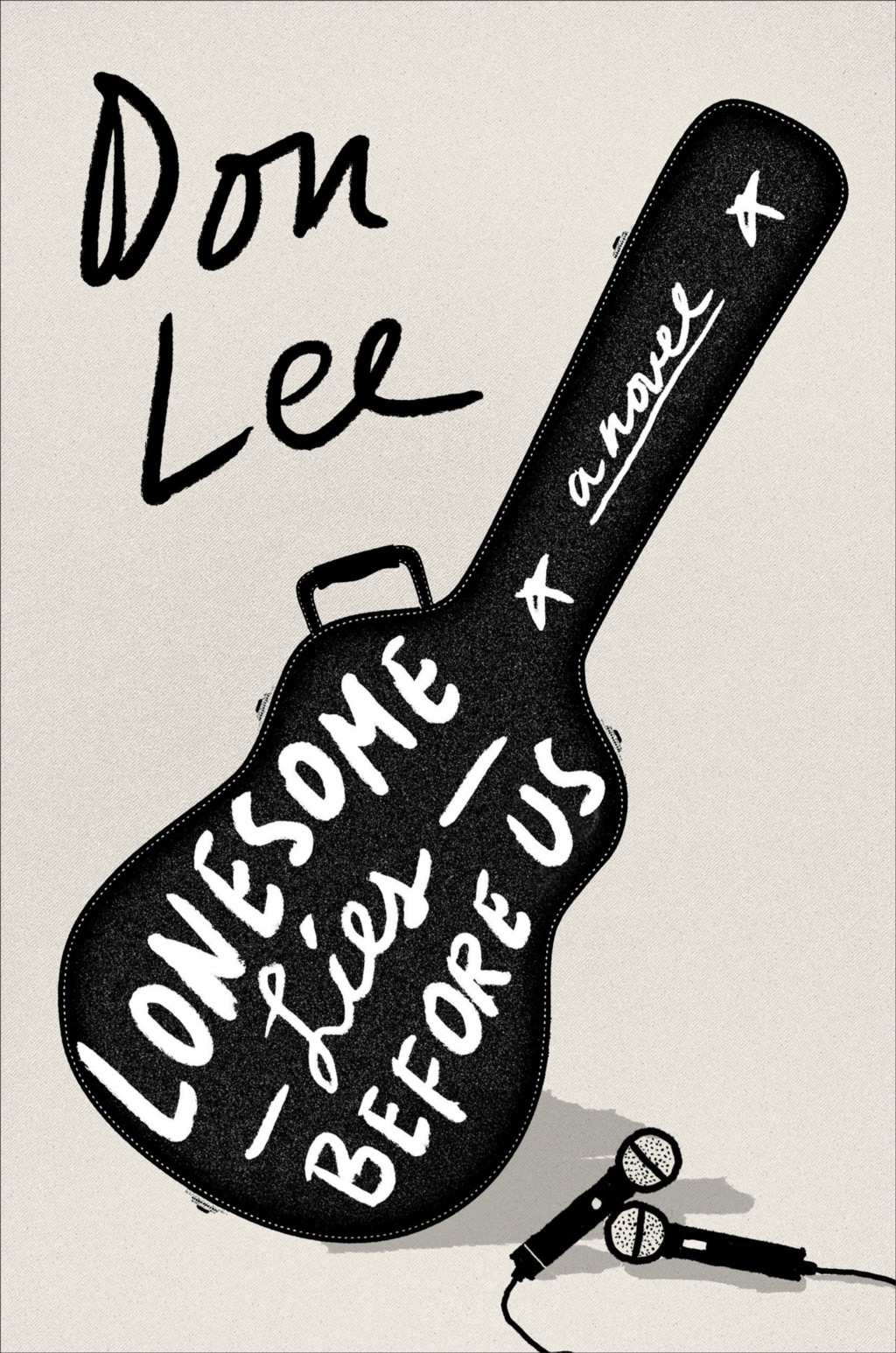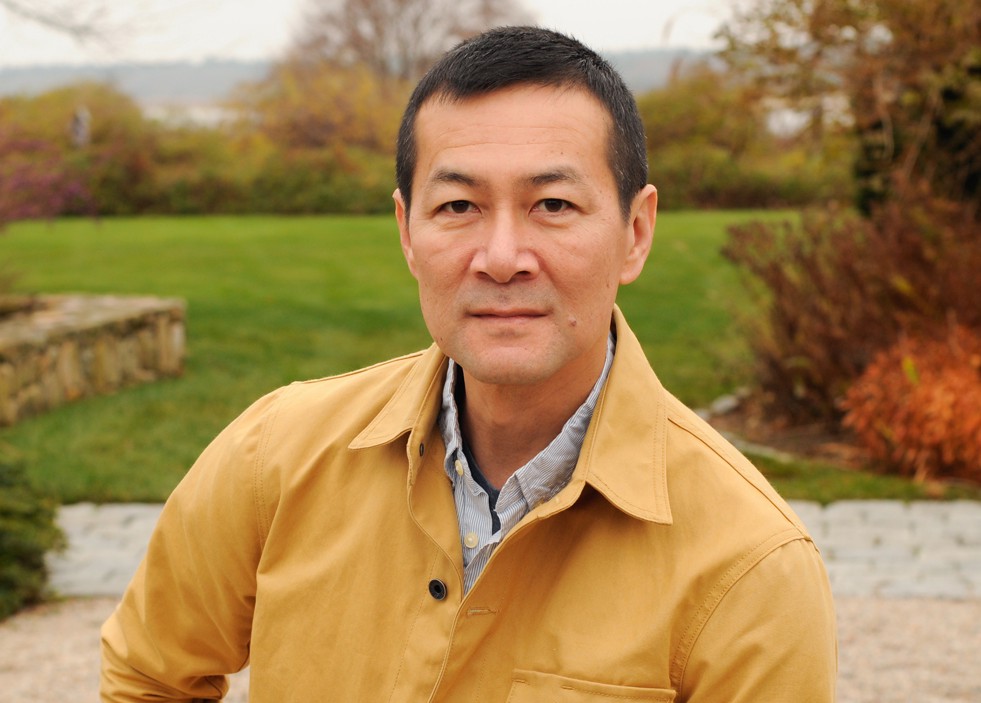Songs of the Voiceless
Don Lee’s affecting new novel

The characters in Don Lee’s new novel Lonesome Lies Before Us are reduced. They have health issues, financial issues, and legal issues. They live in dying towns and work in dying industries. They have destructive compulsions and addictions; people and institutions have let them down. Luckily, the drama and pathos lie not in how they’re reduced, but in how they deal with it — or, more frequently, how they don’t.
A past winner of an American Book Award and an Edgar for his 2004 debut novel Country of Origin, Lee’s previous fiction took questions of Asian-American identity head-on. Lonesome Lies Before Us is his third book set in the Northern California town of Rosarita Bay, a fictionalized Half Moon Bay, where jobs are scarce and locals are beholden to the fruits of fickle tourism. It’s here that Yadin Park, a mostly forgotten songwriter in his mid-forties, has settled as a carpet installer, still writing songs during idle hours and halfheartedly (though not for lack of trying) dating his boss’s daughter, Jeanette.
Novelists have long been enamored by songwriters, and not only because of the likenesses between the two crafts. Where painters, sculptors, and even athletes are ascetics for their art — adherents of intense training, laborious development, and hard-won expertise — songwriters are defined by moments of enlightened inspiration rather than slow mastery of method. They are impulsive romantics, the greatest of whom both inform and reflect the mass mind.
Save for his being a brilliant alt-country composer (can anything be respectably alt-anything, anymore?), Yadin was never a fit for the scene. Despite a small and committed fanbase, he refused to make commercial concessions and never grew comfortable performing, dulling his stage fright with booze and drugs while working his way deeper into debt each year. If that weren’t enough, his recording career was cut short by Meniere’s disease, which has gradually robbed him of his hearing. To limit the damage, he seeks to eke out a quiet existence in Rosarita Bay, minimizing the risks of his former lifestyle by any means possible — strict dieting, steady day labor, and a stable if passionless love life.
Jeanette, too, is self-conscious and unfulfilled, cleaning rooms in Rosarita Bay’s one resort by day, passing long nights with Yadin in a rented bungalow, and tending to her aging father on weekends. Once an idealistic hippie and aspiring photographer, she’s grown cold and disillusioned in middle age, laid off from a job at city hall obviated by automation. Although an avowed atheist, her sole release comes via her involvement in the local Unitarian Universalist church, the existence of which, like most everything else, is threatened by budget cuts.
The Unitarian church as captured by Lee is a fascinating, frustrating outlet for its small congregation of conflicted, compromised attendants. Steeped in Bay Area leftism but riven by the local economy, they join services for fraternity and polite life coaching which more often than not stops short of substantive guidance or authority. For Yadin, the terror of stepping on toes, the church’s inability to even espouse or deny the existence of God, amounts to a shameful spinelessness not unlike the one he perceives in himself and his neighbors. Services are directionless; the choir sings ’70s folk songs. Yadin grows cynical of the ambiguity and dazed political correctness, relishing existential jokes:
How does a UU begin a prayer? To Whom It May Concern. Why do UUs have trouble singing in the choir? They’re always reading ahead to see if they’ll agree with the next verse. What do you get when you cross a Jehovah’s Witness with a UU? Someone who knocks on your door, then says, “I don’t know why I’m here.”
Further exercises in futility take the form of tense town meetings where neither the bickering civil servants nor pleading citizens can fend off impending doom, and the public forums succinctly convey competing forces dividing the town and even individual households. While virtually all of the participants are socially progressive, underemployed minorities, they’re tempted by the decidedly red state concerns of labor unions, home ownership, and factory jobs undercut by immigrants, outsourcing, and technology. In his clipped omniscient narration Lee is never guilty of proselytizing; among the sizable cast there are neither heroes nor villains, and he executes a tender empathy while managing not to look down upon his largely helpless characters.

The lives and circumstances Lee outlines seem harrowingly dismal in the abstract, so the novel’s greatest triumph is the dignity he grants them. They’re believably average people with believably average relationships of the sort most novels would reasonably bypass. Manual laborers all, they’re being slowly killed by the source of their livelihoods, working backbreaking jobs because they have to and then immersing themselves in seemingly frivolous hobbies — music, poetry, supermarket tabloids — because they have nothing else to do. In the stark, at times stilted dialogue, Lee evokes how little friends and lovers ultimately know about each other, and the temptation to hold the past against one another. In efforts to assert his own manhood and leave something to his children, Jeanette’s ornery father seems at once selfish, pathetic, and distantly compassionate, diverting the narrative from self-pity. “Being depressed is a hobby only rich people can afford,” he tells Jeanette in typical aphorism. “You’re too old for ideals,” he later advises her.
With all the grasping for faith, love, and validation, there’s a lot here for such a quiet, earnest book, but Lee keeps it moving with a modest plot. A shadowy figure from the past blows into town, raising the stakes and threatening to upend Yadin and Jeanette’s paper empire. Characters are introduced in their diminished present, then given backstories via Ghost of Christmas Past-style flashbacks. While beautifully rendered, the revelations are grim. Among the hushed sadnesses of family businesses, inherited property, and marriages of convenience, even the most seemingly compatible people are irreconcilable in their damage and yearnings. Revisiting his past, Yadin recognizes the massive consequences of seemingly minor events, and how easily he could have spared himself a harsh adulthood. In his characters’ interactions, Lee presents the debilitating reality that all relationships are, in some sense, parasitic.
The book struggles in its portrayal of music. Like Nick Hornby’s Juliet, Naked and Rob Yardumian’s The Sound of Songs Across the Water, it relies on the poignancy of visceral ballads that don’t actually exist. Like Hornby and Yardumian, Lee transcribes the lyrics in their bare form, which is, of course, only part of the equation. Yadin seems oddly inarticulate for a supposedly great songwriter, especially one with so much material at his disposal.
Against the backdrop of blue-collar warfare Yadin’s friends find his devotion to music trite, and the urgency of a literary novel like Lonesome Lies Before Us may be similarly questioned in our current moment. But virtually of its themes — generational divide, working-class anxiety, the implications of local politics on our way of life — seem intensely vital if not outright prescient. The haunted residents of Rosarita Bay are united by their lack of control, and knowing better than to wish for escape hope merely for consolation. “Yadin had never been happy, and didn’t know if he ever could be,” the narrator proclaims in Lee’s frank eminence. “The best he had ever managed was not to be miserable.” Desperate for grace and solace on anyone’s terms, he finds it in one-sided conversations with his long-dead brother.
It’d be easy to label Lonesome Lies a tragedy, but I think that implies a fall from grace or a fatal error. If Lee’s passive, ghostly characters have a fatal error it’s that they can hardly be called actors at all, ambivalent participants in wavering deviations from the status quo. In wars of attrition, Lonesome Lies finds, there are no winners.
